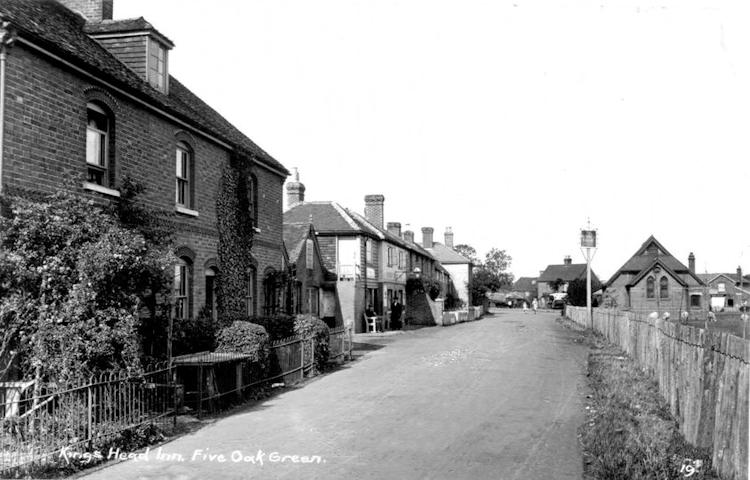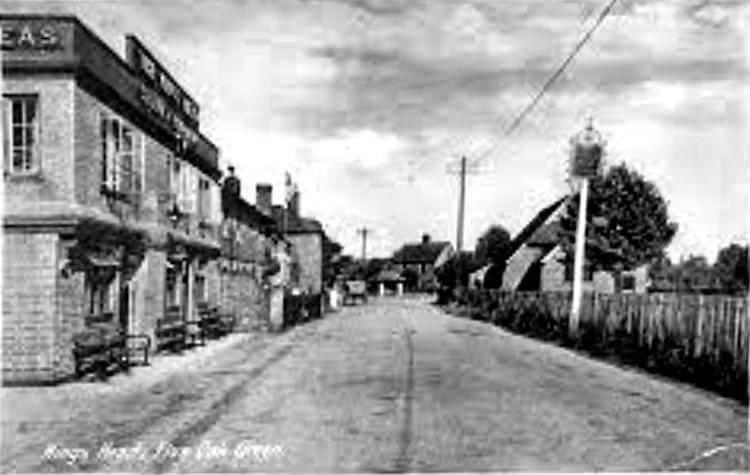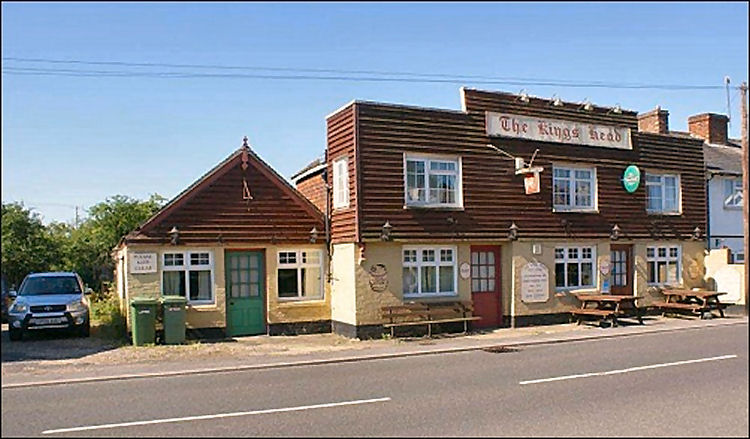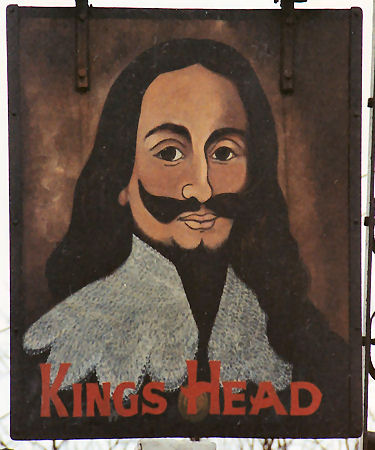|
Badsell Road
Five Oak Green
https://whatpub.com/kings-head
I have also seen this addressed as in nearby Capel.
Advertised as being for sale £290,000 in April 2014. A deceptively large
property with unlimited possibilities situated in the village of Five Oak
Green. Horseshoe shaped servery to saloon bar middle bar area with large
screen television, games/function/meeting room with pool facilities and
dedicated servery, level cooled cellar, trade kitchen, front and rear trade
patios, car park to side for 5 vehicles. Very spacious 6 bedroom
accommodation. Internal viewing recommended. Currently Closed for Trading.
Full refurbishment required.
|
South Eastern Gazette, Tuesday 18 February 1851.
Incendiarism at Brenchley.
Jabez John Brider, who had been but a few days deliberated from gaol,
for the 24th time, was charged with setting fire to a wheat stack, the property of Mr.
William Ansten, at Bogs Hole Farm, in the parish of Brenchley.
William Friend deposed that he was a baker at Five Oak Green, Capel. On
the evening of
the 22nd of February he was going home at about 6 o'clock, and when near
Wheeler's
barn, he saw a wheat stack on fire. He did not see anyone about the
premises. The fire
was too far advanced we put out. John King, labourer, deposed that he lived at Yalding. On Wednesday last
he was going
from Paddock Wood to Pembury, when he saw the wheat stack on fire. There
were 30 to
40 people standing about. He stayed about five minutes, and on going
towards Pembury
he saw the prisoner standing in the turnpike road, about forty rods from
the fire, at about
7 o'clock, who asked him whose property the stack was, and said he
thought he knew the
party who set fire to it, he said it was a chap who had been a good deal
in the Union and
was out of work. William Willsher, farmer and constable, deposed that he lived about 30
rods from the
stack; it was not alight on Wednesday evening at 6 o'clock; shortly
afterwards he found
that it had been set on fire, and on proceeding to it he found William
Friend there, trying
to trace some footmarks leading from the stack. He placed a tub over the
marks, and set a
man to watch. He went in pursuit of the prisoner, and apprehend him at
Pembury, and
delivered him to superintendent Gilbert. Richard S. Gilbert deposed that he received the prisoner from the last
witness. Prisoner
began to make a statement, when he cautioned him; he said; "I don't care
for that; it was
I that did it, and no one else but me; I came down the road, and went
through the gap
above the stack. He said he knew it belong to some farmer, and he
supposed to one who
had opposed him at the board last Friday week, and so he thought he
would give him a
warning. He had a black mark near his ear, so as if scorched by the
fire. John Wheeler, constable of Tudeley, deposed that the prisoner was given
into his
custody by Mr. Gilbert, on Wednesday last, and took him to the "King's
Head," Five Oak
Green, and had charge of him all night; next morning he took off his
boots, and compared
them with the foot marks near the stack, and they corresponded; they
were quite plain
this morning, when he again compared them and they fitted exactly, the
prisoner said he
set the stack alight, and had a good mind to set Mr. Luck's stacks
alight, only they were
too near the house he said he had great difficulty in getting from the
fire without being
burnt, and that in through the wires and pipes and Lucifer matches. Thomas Taylor deposed that he found a pipe, and a piece of paper partly
burnt, and a
match, on Thursday morning, on the right hand side of the road, about
forty rods from the
fire. William Austin, farmer, Bogshole, Brenchley, deposed that the stack
which was burned
down was his property. The prisoner said, he was driven to it; he had applied to the board on
two Fridays, and
they have refused to relieve him, he did not know to whom the stack
belonged, but
supposed it belonged to one of the guardians; he did it from Malice. Committed for trial. |
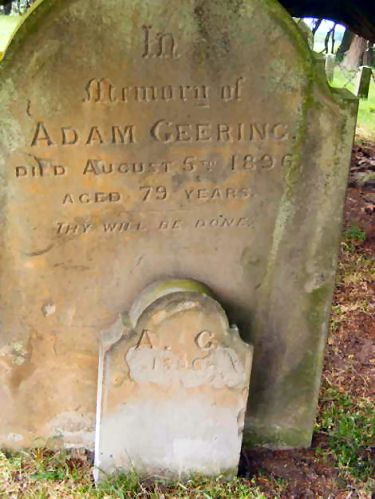
Above photo showing the headstone of licensee Adam Geering junior, who
is buried in Capel Church Graveyard.
|
|
From the Kent and Sussex Courier. 3 October, 1873.
Price 1d.
AN EXTRAORDINARY PUBLIC HOUSE CASE.
James Warnett, landlord of the "King's Head Inn," Capel, was summoned
for having his house open for the sale of beer during prohibited hours
on the 14th ult., Capel.
Mr. W. Gorham defended.
P.C. Whibly said that at about ten minutes to 3 o'clock on Sunday
afternoon, Sept. 14th, he visited the "King's Head Inn," Capel, kept by
the defendant, and in the bar he saw William Crayford standing up with a
quart pot containing beer. The defendant was present at the time, and
his wife was at the same time selling beer to the hoppers in bottles.
There were about sixty or seventy hoppers there singing, and making a
great noise, and when he called the defendant's attention to the affair
he said his time was correct—his clock was at five and twenty minutes to
three o'clock. Defendant followed witness out into the street and told
him he had better look after the beer-houses, and if witness reported
him he should report him to Supt. Dance for drinking and smoking in
beer-houses. He added he could look after his house himself, and witness
had letter look after his 'back numbers.' Upon that the hop pickers
commenced shooting at him.
By Supt. Dance: Knew his watch was correct and it was ten minutes to
three o'clock.
By Mr. Gorham: Never knew a policeman's watch or clock turn out to be
wrong. Policeman's watches are generally infallible. It was ten minutes
to three o'clock when I went in. That was by my time and railway time. I
never said that the hoppers were turned out right by the defendant's
time but wrong by mine. I did not say to anyone it was nearly half-past
two o'clock, and I must turn the hop pickers out.
Mr. Gorham: Have you got your watch?
Witness: Yes.
Mr. Gorham: What is the time by it.
Witness: (looking at the clock in the Court which was twenty minutes
past twelve o'clock, the real time being fifteen minutes past)
Twenty minutes past twelve o'clock.
Mr. Gorham: Let me look at it.
Witness: Oh no, I have made a mistake, it is ten minutes past.
Mr. Gorham looked at the watch and then handed it to the Bench,
remarking upon the statement of the police, which was contrary to the
time indicated by the watch.
John Martin, labourer, said he lived near the "King's Head," and was
standing by the side of the fence on the Sunday in question, being about
going to Church. At about ten minutes to three o'clock, he saw a number
of hoppers go out of the house.
Whibley, the policeman, was followed by the landlord, who told him he
could conduct his house himself and the policeman had better look after
the beer-houses.
By Supt. Dance: He could not see the door of the house, because of a
projecting wall. He could only see them come off the pavement.
By Mr. Gorham: He knew the time by his watch which he did not set
according to Whibley's.
Mrs. Mercer said she lived opposite "King's Head," and on Sunday
afternoon, at about 10 minutes to three, she saw a number of hop-pickers
apparently attempting to get into the house. She saw Whibley come out of
the house exactly at eight minutes to three o'clock, and he was followed
by a number of hop-pickers, who, she imagined by their manner, were far
from being sober.
By Mr Gorham: Looked at the clock and said that as it was eight
minutes to three o'clock Warnett was all right, but Mr. Mercer said he
was wrong, because he should close at half-past two o'clock. Mr. Gorham
said this being the whole of the evidence offered on the part of the
police, he asked whether he need address their worships on the case
which almost entirely rated upon the testimony of the policeman, who had
said that a policeman's watch was infallible, and had endeavoured to
support that argument by shewing the infallibility of his own watch. The
policeman had been in this case a little too premature.
Defendant was then called, and said: On the afternoon of Sunday, the
14th, there were several persons in my house at about two o'clock. I was
aware what were the proper hours for closing. At five-and-twenty minutes
past two o'clock I ordered the men to leave, and I drew no more beer.
Exactly at the half-hour my wife drew a pint of beer in a bottle, which
was taken away. Not one drop was afterwards drawn. It was exactly at
half-past two o'clock when Whibley came in. He made a sort of a rush,
and mine being a narrow passage, he sent the people back. He said, "Now,
Mrs. Wamett, do you know what you are doing?" She said, "All right; look
at the time." I did not see the policeman's watch, nor did he pull it
out in my presence. I told him he had better go and look after the
beer-houses, and not let the people come up and annoy me as they had
done all the morning. I told him I should report him to Supt. Dance, but
he said I had been there so often that they would not take any notice of
me. I sent out my man to see if other places were closed. After I
cleared all out I looked at my watch and it was twenty five minutes to
three o'clock. I know my watch was correct time, and on comparing my
time with two other gentlemen's watches, I found we all agreed. I came
to Tonbridge and ascertained my time was right by the railway clock.
Some time afterwards, Supt. Dance and Whibley called upon me, and I told
them my time was right. Whibley said I turned out right by my time but
not according to his. I told Mr. Dance I had seven watches to one
against him.
By Supt. Dance: After the house was cleared I looked at my watch and
it was then 25 minutes to three o'clock. I am sure Whibley said I turned
out right by my time. If the constable had waited half a minute the
hoppers would all have been out. I did not set my watch on the Sunday by
the railway time because it was correct. I am not in the habit of
following the police round the beer-houses, watching them, and telling
them to look after the beer-houses. I did not invite the mob to call out
at the policeman.
William Tubbs, blacksmith, in the employ of the defendant, said that
on the day in question at about twenty seven minutes past two o'clock,
he heard the defendant tell the people to clear out. After the policeman
had called, and the people had been turned out, he went to the two
beer-houses, and found that both of them were open. It took him five
minutes to go to the beer-houses.
By Supt. Dance: I knew it was twenty minutes past two o'clock because
I looked at the clock and my watch. I have been sent, to watch the
beer-houses to see what time they closed.
Alexander Terry, blacksmith, in the employ of Mr. Mercer, of Capel,
said he lived near the "King's Head," and on the afternoon of the Sunday
in question, he saw the people turn out of the house at half past two
o'clock, and the door closed exactly at twenty five minutes to three
o'clock. He made a remark at the time that the people had turned out
very quietly. He compared his watch with the railway time at Paddock
Wood and found that Mr. Warnett's time was perfectly correct.
By Supt. Dance: I did not go to the Mote Farm, to say it was the
Sunday before, I did not go that afternoon I mean. The people were
pretty quiet, hot of course you cannot expect a lot of hop-pickers to be
very quiet. I did not see the men mob the police. In the evening I
compared my watch with Whibley's. My watch was ten minutes to six
o'clock, and Whibley's ten minutes past. My watch was one minute last by
railway time.
George Martin, labourer, of Capel, said he lived close to the "King's
Head." On the Sunday afternoon in question he saw Whibley pass by, and
heard him say, "Surely it must be pretty nearly half-past two o'clock."
He said to his wife they were pretty sharp on Mr. Warnett. The policeman
went round to the public-house. When the policeman went by he looked at
his watch, and saw it was 27 minutes past two o'clock.
By Superintendent Dance: My son is a witness here to-day, but he was
not in my house when the police-man passed.
Mr Gorham drew the attention of the Bench to the case of Kates v.
South, in which Mr. Justice Cockburn said 'the landlord was not bound to
turn out customers when the clock struck twelve' and that there must be
direct evidence of sale, and to show that House was wilfully kept open
after hours for the purpose of inviting persons in. He thought after
that case the Bench would find it utterly impossible to convict the
defendant on the evidence adduced.
The Chairman said they had given the case a great deal of attention.
There was a great deal of discrepancy as to time, and they were
therefore disposed to give the defendant the benefit of the doubt and
dismiss the case.
|
|
From the Kent and Sussex Courier, 8 May 1874.
Five Oak Green. Extraordinary Death of an Old Man.
On Tuesday, J. N. Dudlow, Esq., one of the coroner's for Kent, held an
inquest at the "Kings Head Inn," relative to the death of John
Easterfield, 85 years of age, a gardener, living in a cottage by
himself.
The following were the jury:- W. Barnett (forman), C. Brotherwood, J.
Collins, E. Fever, R. Fever, W. Fever, A. Fry, J. Knell, S. Larkin, J.
Lawrence, J. Pearson, and H. Sole.
William Tubbs deposed that he was in the employ of Mr. Warnett,
blacksmith, of Five Oak Green, and on Friday he went to the deceased's
cottage, shortly before noon, for some greens for his master. He could
not make anyone here at the front door, and, thinking he could see the
old man on the floor through the window, he went to the back door, which
was open. He went through the scullery into the kitchen, and there found
the deceased lying in the corner of the fireplace, with his left arm on
the fender. He was quite dead, and he could see that his clothes were a
good deal burnt. His hat was slouched on the back of his head. A kettle
was in the fireplace, but he could not say whether there was any water
in it. There was a cup and saucer on the table, and a short distance
from the door he saw a teapot containing a little tea, with a handle
towards the door. The front door was fastened at the bottom, but both
the back doors were open. Deceased used to go through the back door to
fetch his water. There was no food on the table, but plenty in the
cupboard, and near the window was a bottle containing rum. He saw a
penny-piece lying on the corner of the table. Could not say whether the
deceased had been touched after death, but should say if he fell down
his hat would have tumbled off. There was mud and cobwebs on the hat,
but there was none in the corner where he found him. The deceased and
complained to him of giddiness.
James Warnett, landlord of the "Kings Head," and a master blacksmith,
spoke to the position and appearance of the body after it was found by
the last witness, and said it looked to him as if it had been pushed
into the corner. The witness also said that a man named Langridge,
living next door to the deceased, was accused of stealing some of his
broccoli, and the leaves were found close to his back door and the ends
in his pig-tub; and in consequence his (Warnett's) wife gave Langridge
notice to leave, which greatly displeased him, and as the broccoli was
referred to, he said, "I'll broccoli that old _____." That was on the
Monday, as deceased was found dead on the following Friday. He lasts saw
the deceased alive about 2 o'clock on Wednesday afternoon, when he
appeared in very good health.
The wife of the last witness deposed that deceased had complain to her
of weakness, and she had told him to be very particular and not get near
the fire. She also deposed to giving Langridge notice, when he use the
threat stated by the last witness.
Jane Ann Wheeler, a widow, deposed that on a Monday night, when she last
saw defendant alive, he complained to her of a "swimmy" sensation in his
head. She helped to lay the deceased out, and he was very much burnt
about the back and left arm, and on his left side was a bruise as big as
a man's fist. In his pockets she found an empty purse, and in a table
drawer 4s. in silver.
Mr. Caleb Gargory, surgeon, of Pembury, was examined, and his evidence
appeared to favour the idea of the death had taken place while deceased
was in a state of syncope, but he concluded by stating that he could not
say what was the cause of death unless he made a post-mortem
examination.
The Coroner summed up, and said that no doubt the threats used by
Langridge were mere idle threats, which were never carried into
execution. Nothing had been touched in the house to warrant the
supposition that robbery had been committed. It was unfortunate that
Langridge had made use of such threats. The case was reported to him,
and he thought death the result of an accident, and therefore deemed it
unnecessary to hold an inquest; but on the fact of Langridge having used
threats being reported to him, he rescinded his former order, and hence
the present inquiry.
After a good deal of conversation, the jury returned a verdict that
deceased died in a fit.
Some of the neighbours and friends of the deceased seemed greatly
dissatisfied with the result of the inquiry.
|
|
From the Kent and Sussex Courier, 25 August, 1876.
ALLEGED LICENSING OFFENCES.
Sarah Scoones was summoned for unlawfully selling beer, to be
consumed on her premises, at Capel, on the 14th inst., without a
license.
Mr Rogers, solicitor, applied for a remand, in order that witnesses
might be summoned to give evidence on behalf of the defendant, and the
application was granted.
|
|
From the Kent and Sussex Courier, 30 August 1876.
CAPEL ALLEGED SELLING BEER WITHOUT A LICENSE.
Sarah Scoones, grocer, of Capel, was summonsed for selling liquor to
be consumed on unlicensed premises on the 14th August.
Mr Rogers defended.
P.C. Whibley said that on Monday, August 14th, at about half-past
five o'clock in the afternoon, he was on duty at Five Oak Green, and saw
Dennis Burr go from the defendant’s shop with a pot of beer, and as soon
as he got out of the door he drunk out of the pot while standing on a
patch close to the door. He then put the pot down within a few feet of
the path, and walked past the old lock-up. He then sat down on a post,
and afterwards he took the pot into the defendant’s shop. The defendant
was not there, and he called her. She came, and he told her that he had
seen Burr drinking against her door, and in reply to a question, she
said that Burr bought the beer, and that the pot it was in belonged to
her. Witness then reminded her that she had only an outdoor license, and
she replied that the Excise Authorities had told her that persons could
drink just outside the door.
By Mr Rogers:- He only saw Burr present, and did not see Mrs
Springate. Burr drunk the beer just outside the house, and she had no
control over him when he got outside the shop. Considered that the brick
pavement was part of Mrs Scoones premises. James Warnett, landlord of
the "King's Head," Capel, Five Oak Green, said he saw Burr and the and
the policeman together, and heard Mrs Scoones call the policeman a
"bullying man."
Mr Rogers submitted that the defendant had committed no offence, and
he called the defendant, who said that about half an hour before the
policeman called Burr had a pint of beer, which she told him to drink
outside her house. He went outside, and afterwards a Mrs Springate
called and took a pot of beer to Burr, who had carried some things home
for her. Burr stood on land over which she had no control.
Dennis Burr, who said he was 18 years of age, said be stood on Mr
Larkin's premises when Mrs Springate brought him out a pint of beer. He
denied that he drunk the first pint of beer until he got to the post,
and the second pint of beer Mrs Springate brought to him.
Mrs Springate said she bought a pint of beer for Burr, and took it out
to him. Defendant told her the beer must not be drunk on her premises.
Mary Taylor said she saw Burr drink the beer on the post, and also
saw Whibley take the pot from Burr. The landlord of the "King’s Head"
came out some time afterwards.
Emily Mercer corroborated the statement of her.
The Bench said it was a very suspicious case, but giving her the
benefit of the doubt, they dismissed the case with a caution as to her
future conduct.
|
|
The Chronicle and Courier, 16 September, 1921.
Lamberhurst Brewery Estate.
Important sale at Tunbridge Wells.
One of the biggest sales of licensed houses held in the provinces in
recent years was conducted by Messrs. Wickenden and Sons at the Pump
Room, Tunbridge Wells, on Friday, when the Lamberhurst Brewery
Estate, comprising 68 lots, came Under the Hammer. The lots sold were:-
....
"Kings Head," Five Oak Green £4,960
....
|
Latest news received in November 2017 is that the pub closed and has been
converted into residential use, although partly demolished the facade has been preserved.
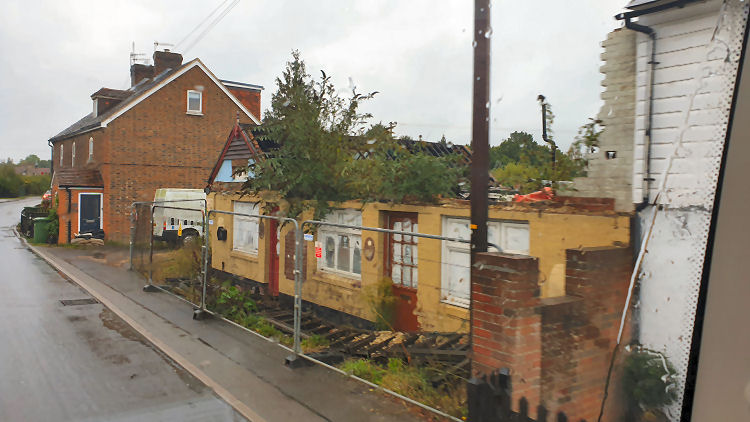
Above photo 2020, kindly sent by Ben Plant. |
LICENSEE LIST
GEERING Adam 1828-34+
 
GEERING Adam (jun) 1847+ (also blacksmith age 30 in 1847)

PLATT James 1858-July/59

FIRMINGER/FERMONGER Frederick July/1859-62+ (age 46 in 1861 ) )

WARNETT James 1873-76+ (also blacksmith)

CHATFIELD Frederick 1881+ (also blacksmith age 39 in 1881 ) )
PEARSON Henry 1901+ (age 42 in 1901 ) )
TULLY Charles 1903+

TULLY Ernest 1913-30+
MACEY John F 1938+
https://pubwiki.co.uk/KingsHead.shtml
 From the Pigot's Directory 1828-29 From the Pigot's Directory 1828-29
 From the Pigot's Directory 1832-33-34 From the Pigot's Directory 1832-33-34
 From Bagshaw Directory 1847 From Bagshaw Directory 1847
 Kent
and Sussex Courier Kent
and Sussex Courier
 Sussex Advertiser Sussex Advertiser
 Census Census
 From the Kelly's Directory 1903 From the Kelly's Directory 1903
|
